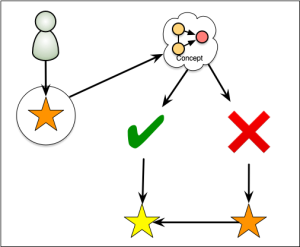There’s been a lot of talk, of late, about workflow learning. To be fair, Jay Cross was talking about learning in the flow of work way back in the late 1990s, but the idea has been recently suborned and become current. Yet, the question remains whether it’s real or a mislabeling (something I’m kind of anal about, see microlearning). So, I think it’s worth unpacking the concept to see what’s there (and what may not be). Is workflow learning a myth?
To start, the notion is that it’s learning at the moment of need. Which sounds good. Yet, do we really need learning? The idea Jay pointed to in his book Informal Learning, was talking about Gloria Gery’s work on helping people in the moment. Which is good! But is it learning? Gloria was really talking about performance support, where we’re looking to overcome our cognitive limitations. In particular, memory, and putting the information into the world instead of in the head. Which isn’t learning! It’s valuable, and we don’t do it enough, but it’s not learning.
Why? Well, because learning requires action and reflection. The latter can just be thinking about the implications, or in Harold Jarche’s Personal Knowledge Mastery model, it’s about experimenting and representing. In formal learning, of course, it’s feedback. I’ve argued we could do that, by providing just a thin layer on top of our performance support. However, I’ve never seen same! So, you’re going to do, and then not learn. Okay, if it’s biologically primary (something we’re wired to learn, like speaking), you’re liable to pick it up over time, but if it’s biologically secondary (something we’ve created and aren’t tuned for, e.g. reading) I’d suggest it’s less likely. Again, performance is the goal. Though learning can be useful to support comprehending context and making complex decisions, what we’re good at.
What is problematic is the notion of workflow and reflection in conjunction. Simply, if you’re reflecting, you’re by definition out of the workflow! You’re not performing, you’re stopping and thinking. Which is valuable, but not ‘flow’. Sure, I may be overly focused on workflow being in the ‘zone’, acting instead of thinking, but that, to me, is really the notion. Learning happens when you stop and contemplate and/or collaborate.
So, if you want to define workflow to include the reflection and thoughtful work, then there is such a thing. But I wonder if it’s more useful to separate out the reflection as things to value, facilitate, and develop. It’s not like we’re born with good reflection practices, or we wouldn’t need to do research on the value of concept mapping and sketch noting and how it’s better than highlighting. So being clear about the phases of work and how to do them best seems to me to be worthwhile.
Look, we should use performance support where we can. It’s typically cheaper and more effective than trying to put information into the head. We should also consider adding some learning content on top of performance support in times where people knowing why we’re doing it as much as what we should do is helpful. Learning should be used when it’s the best solution, of course. But we should be clear about what we’re doing.
I can see arguments why talking about workflow learning is good. It may be a way to get those not in our field to think about performance support. I can also see why it’s bad, leading us into the mistaken belief that we can learn while we do without breaking up our actions. I don’t have a definitive answer to “is workflow learning a myth” (so this would be an addition to the ‘misconceptions’ section of my myths book ;). What I think is important, however, is to unpack the concepts, so at least we’re clear about what learning is, about what workflow is, and when we should do either. Thoughts?

